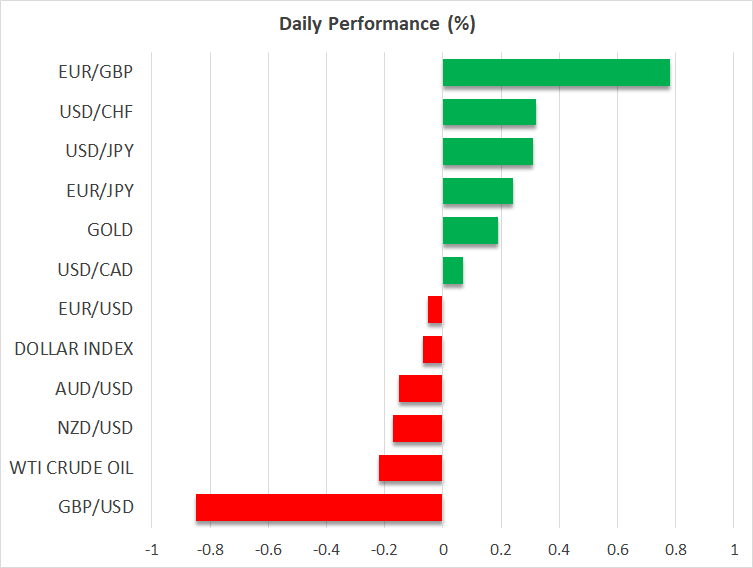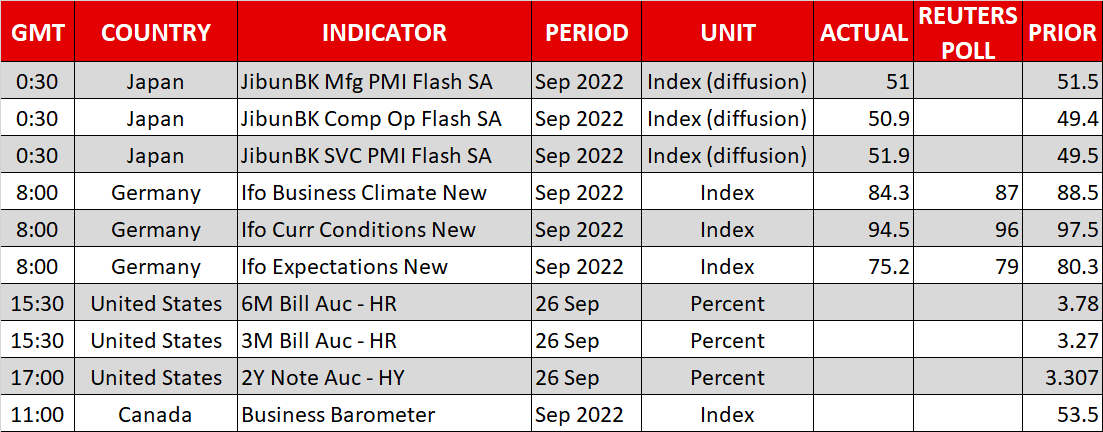Pound Crashes, Stocks Pummeled After UK Budget
2022.09.26 07:54
[ad_1]
- Pound leads declines in FX markets, approaches parity, as UK budget sparks panic
- UK yields soar, Italian yields jump too as far-right win adds to uncertainty
- Dollar scales fresh highs, stocks sink but some signs of recovery today

UK budget gets big thumbs down from investors
Markets reacted in the worst possible way to the UK’s economic plan unveiled on Friday, sending the pound to rock-bottom levels against the US dollar, while dumping UK gilts. Chancellor Kwasi Kwarteng announced the biggest tax cuts in 50 years in a drive to promote growth in the flagging British economy. But combined with the energy package, which itself was more generous than anticipated, investors fear that borrowing could swell to unsustainable levels.
What was meant to be a ‘mini-budget’ turned out to be the most radical set of policies since possibly the Thatcher era. But markets viewed the plan as more of an experiment than sound economics as Liz Truss’ government basically wants to borrow its way out of the cost-of-living crisis at a time when inflation is high and interest rates are rising.
Even if the tax cuts work in boosting the economy, this will make the inflation problem worse, forcing the Bank of England to hike rates even more aggressively. That would then further add to the cost for the government to borrow record amounts, making the national debt unmanageable, hence, this downward spiral in sterling.
Pound heads towards parity as yields spike
The pound plunged on Friday and again in early Asian trading today, hitting an all-time low of $1.0382. It has since steadied to above $1.07 but volatility remains elevated. The yield on 10-year gilts has shot up to 12-year highs, catapulting past 4.0%.
You cannot get a stronger sign of a vote of no confidence from the markets than from surging yields and a crumbling currency. Yet, Kwarteng signalled further tax cuts to come over the weekend, with investors not reassured by his promise to publish a medium-term fiscal plan on reducing the country’s debt-to-GDP ratio.
But in the more immediate term, all eyes are on the Bank of England for a possible emergency rate hike to halt sterling’s freefall. The Bank only raised rates last week, but that was before policymakers knew how stimulative the budget would be. Speculation is rife of a 100-basis-point intervention.
Euro pares losses after election scare in Italy
In other currencies, the frantic selloff against the mighty US dollar began to ease on Monday. The pulled back sharply from a new 20-year high of 114.527 brushed earlier in the day. The yen was back under pressure but remained some distance from the 145 mark that could prompt further intervention from the Bank of Japan, while the euro and commodity-linked currencies were down only marginally from Friday’s close.
The euro briefly hit a low of $0.9565 at the open following the early results from the general election in Italy where a right-wing bloc led by the far-right Brothers of Italy party looks set to win a majority in both houses of parliament. As the country prepares to have its first female prime minister – Giorgia Meloni, who heads the coalition – investors are nervous what this might mean for European unity, amid doubts about her opposition to Russia’s invasion of Ukraine, as well as for the need to maintain fiscal discipline.
Italian government bonds have slid the most in the euro bloc during the latest rout, though yield spreads with German bunds have not widened to alarming levels.
Recession jitters grow, gold hits fresh lows
Nevertheless, with pretty much all currencies collapsing against the greenback, expectations are rising that central banks around the world will have to hike interest rates even more rapidly now and this is only feeding into recession fears.
Markets are also grappling with the growing unease about what implications Russia’s referendum on annexation in the occupied regions of Ukraine will have on the conflict, amid concerns that Moscow could resort to nuclear weapons to defend its ‘territories’.
However, the heightened geopolitical risks did little to support gold against the backdrop of rising bond yields and a strong dollar. The precious metal started the week at near 2½-year lows before steadying around $1,645/oz.
Equities slump again, but could be about to rebound
Stocks also came off their lows today after the S&P 500 closed at its lowest since June on Friday. US futures were attempting to recoup earlier losses, while in Europe, German and French stocks had turned positive.
It remains to be seen whether the bottom reached by Wall Street in June will hold during the latest selloff, but given how steep the slide has been, a small rebound, even if it’s short-lived, seems plausible. Although, investors may want to wait to hear first from Fed Chair Powell, who is due to speak on Wednesday, before rushing in to find bargain stocks.
[ad_2]
Source link







